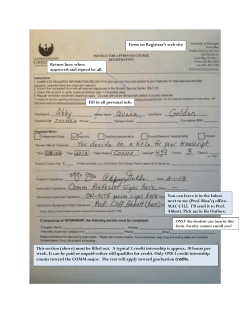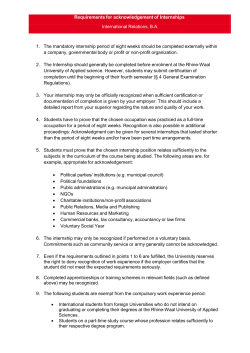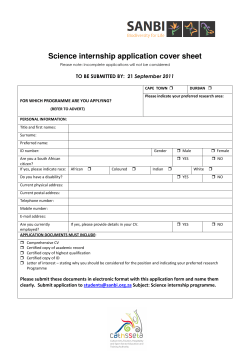
Internship in clinical optometry LVPEI 2015 Brochure
Mark Nathaniel Thadikonda and Vijayamma Nannepaga Center for Eye Care Education Clinical Internship - Optometry (July 2015 – June 2016) L V Prasad Eye Institute Kallam Anji Reddy Campus Hyderabad, India Vision To create excellent and equitable eye care systems that reaches all those in need. Mission The mission of L V Prasad Eye Institute is to be a centre of excellence in eye care services, basic and clinical research into eye diseases and vision-threatening conditions, training, product development, and rehabilitation for those with incurable visual disability, with a focus on extending equitable and efficient eye care to underserved populations in the developing world. The LVPEI Eye Health Pyramid L V Prasad Eye Institute L V Prasad Eye Institute is a comprehensive eye health facility with its main campus located in Hyderabad, India. A World Health Organization Collaborating Centre for Prevention of Blindness, the institute offers comprehensive patient care, sight enhancement and rehabilitation services and high-impact rural eye health programs. It also pursues cutting edge research and offers training in human resources for all levels of ophthalmic personnel. LVPEI’s mission is to provide equitable and efficient eye care to all sections of society. Since its establishment in 1987 it has served over 17 million (1.7 crore) people with more than 50% services provided free of cost, regardless of complexity; provided direct service to over 2000 villages through secondary and primary care; trained about 13,250 eye care professionals from India and abroad; awarded 29 PhDs and published over 1300 research papers; helped rehabilitate over 100,000 persons with irreversible blindness or low vision; harvested over 43,000 donor corneas, and transplanted over 22,750 of them to needy patients; set up permanent infrastructure in 18 of the 23 districts of Andhra Pradesh; and helped upgrade eye care programs in 18 states of India and 16 other countries. L V Prasad Eye Institute works out of 120 locations, its network including a Centre of Excellence in Hyderabad, 3 tertiary centres in Bhubaneswar, Visakhapatnam and Vijayawada, 11 secondary and 100 primary care centres that cover the remotest rural areas in the state of Andhra Pradesh, India, as well as several City Centres. The institute’s innovative and comprehensive approach to community eye health, the LVPEI Eye Health Pyramid, has been adopted as a model by the government of India and by other developing countries. LVPEI is a not-for-profit organization governed by two trusts: the Hyderabad Eye Institute and the Hyderabad Eye Research Foundation. The institute is a World Health Organization Collaborating Centre for Prevention of Blindness and a Global Resource Center for VISION 2020: The Right to Sight initiative. The Institute’s Kallam Anji Reddy campus in Hyderabad and the Bhubaneswar Campus are accredited by the National Accreditation Board for Hospitals and Healthcare Providers (NABH). The institute’s rural and urban community eye health programs include surveys of over 7,438 villages with a total population of over 6.8 million, of which about 12.6% were identified as having eye problems. Teams of community eye health workers, including local volunteers have conducted more than 7,007 community screening and 7,711 school and anganwadi screening programs. The LVPEI Eye Care Network Internship in Optometry COURSE SYNOPSIS The Bausch & Lomb School of Optometry at LVPEI offers internship to optometry students who have completed the first three years of their undergraduate optometry course from a recognized school/college of optometry in India. Internship slots are available at any of the four tertiary centres of LVPEI: Hyderabad, Bhubaneswar, Visakhapatnam and Vijayawada. PROGRAM DURATION 12 Months PROGRAM COMMENCING DATE June – July of every year. Exact date will be indicated for interested candidates LEARNING OBJECTIVES Patient Care: Students must be able to provide patient care that is compassionate, appropriate, and effective. At the end of their internship students should be able to: 1. Use appropriate interviewing skills to elicit an accurate and thorough history addressing the onset and persistence of the condition in the context of the patient’s life. 2. Perform a detailed and accurate examination of the eye in a timely manner. 3. Choose a diagnostic and management intervention based on sound reasoning using all the tools of evidence-based practice of optometry. 4. Communicate effectively with General Practitioners, other health professionals, and health-related agencies to coordinate care and improve patient safety and quality of care. 5. Recognise limits of clinical expertise and seek help appropriately. Optometric Knowledge: Students must demonstrate knowledge about established and evolving basic and clinical science, as well as the application of this knowledge to patient care. At the end of their internship students should be able to: 1. Use clinical reasoning processes to interpret data to derive a differential diagnosis and develop a clinical management plan, including in the areas of Anterior Eye, Binocular Vision, Contact Lenses, Glaucoma, Low Vision, Medical Retina, and Paediatrics. 2. Select, justify, and interpret appropriate clinical tests and diagnostic procedures with attention to benefits, harm and cost. 3. Demonstrate knowledge of the ethical, moral and legal foundations of optometric care. 4. Recognise the social determinants of vision disorders and disease, and the influence of physical, social and cultural environments. Practice-Based Learning and Improvement: Students must be able to investigate and evaluate their approach to patient care, appraise and assimilate scientific evidence, and continuously improve patient care based on selfevaluation and life-long learning. At the end of their internship students should be able to: 1. Demonstrate an ability to identify strengths and weaknesses in knowledge and skills, and seek opportunities to strengthen those deficits. 2. Demonstrate the ability to give and receive constructive, formative feedback to enhance patient care. 3. Utilise established patient pathways to provide care to patients and to help develop pathways to improve safe, quality patient care. 4. Utilise information technology in the practice of life-long learning and to support patient care 5. Decide and promote patient education. Interpersonal and Communication Skills: Students must be able to demonstrate interpersonal and communication skills that result in effective information exchange with patients, patients’ families, and professional associates. At the end of their internship students should be able to: 1. Communicate effectively with patients and families across a broad range of socioeconomic and cultural backgrounds, and demonstrate sensitivity in the care of patients by treating them as an individual with consideration of age, culture, disability, education, ethnicity, gender, gender identity, race, religion, sexual orientation, and socioeconomic background. 2. Communicate perceptively in difficult situations including: giving bad news, disclosing errors, and working with distressed patients and their family members. 3. Articulate an accurate clinical question when needed to support collaborative care. Professionalism: Students must demonstrate adherence to ethical principles, and a commitment to carrying out professional responsibilities in the best interest of the patient and the community. At the end of their internship students should be able to: 1. Apply principles of autonomy, beneficence, and justice, and work to resolve ethical dilemmas with other eye care professionals (e.g., Ophthalmologists) as they arise in clinical practice. 2. Demonstrate honesty, integrity, respect, reliability, responsibility, and confidentiality in all interactions with patients, families, colleagues, and other professional contacts. 3. Show commitment to lifelong cultivation of empathy, compassion, selfcompassion, and self-care. 4. Show commitment to the prevention of vision disorders and eye disease and injury and the promotion of health and wellbeing within the community. LEARNING OUTCOMES By the END of Internship all the graduates would have acquired the following clinical skills thereby meeting community expectations of an optometrist and fulfilled one’s own professional aspirations The following clinical performances are achieved 1. Ability to obtain relevant history and information relating to general health, previous ocular health, previous surgical/laser interventions, information on the investigation done, medication, family history, work, lifestyle and personal requirements 2. Ability to assess the well-being of the patient before proceeding with the various tests 3. Ability to determine the visual acuity/ vision of the patient and the refractive status of the patient objectively 4. Ability to determine the refractive status of the patient subjectively and prescribe appropriate glasses. 5. Ability to determine the pupillary functions and ability to refer in indicated cases. 6. Ability to assess tear dynamics and ability to manage tear abnormalities or refer in indicated cases. 7. Ability to examine the anterior segment & Posterior segment of the eye and ability to refer indicated cases appropriately. 8. Ability to assess the intraocular pressures of the eye and ability to refer indicated cases. 9. Ability to perform ancillary tests based on patients history and preliminary examination. The following sub-speciality performance are also gained A) Contact Lens 1. Ability to assess the suitability of contact lenses as a form of correction for the patient 2. Ability to select, fit and order the most appropriate soft contact lens based on patient's refraction, visual requirements and pre-fitting evaluation 3. Ability to instruct the patient in soft lens handling and how to wear and maintain them 4. Ability to manage the aftercare of patients wearing soft lenses 5. Ability to select, fit and order the most appropriate rigid gas permeable contact lens based on patient's refraction, visual requirements and other findings 6. Ability to instruct the patient in rigid lens handling and how to wear and care for them 7. Ability to manage the aftercare of patients wearing rigid lenses 8. Ability to choose and manage the fitting of toric contact lenses 9. Ability to verify the parameters on receiving the lenses 10. Ability to recommend and prescribe therapeutic and cosmetic contact lenses 11. Ability to identify and manage Contact lens related complications 12. Ability to refer special cases to contact lens experts B) Binocular Vision 1. Ability to assess and interpret the diagnostic parameters of motor binocular vision and oculomotor performance. 2. Ability to assess and interpret accommodative status. 3. Ability to assess and interpret the diagnostic parameters of sensory binocular vision 4. Ability to diagnose and manage amblyopia. 5. Ability to identify and manage children at risk of developing an anomaly of binocular vision. C) Visual Impairment 1. Ability to identify patients benefiting from low vision services 2. Ability to identify and prescribe low vision devices suited to the patient's visual requirements and functional needs 3. Ability to demonstrate a range of low vision devices 4. Ability to instruct the patient in the use of the low vision device 5. Ability to evaluate and monitor the success of the low vision device and prescribe additional or alternative devices 6. Ability to inform and, if necessary, refer the patient to other rehabilitative services. D) Optical Dispensing 1. Ability to interpret the prescription. 2. Ability to identify parameters of previous spectacles 3. Ability to assess suitability of spectacles as a form of correction for the patient 4. Ability to assist patient in selecting the appropriate spectacle frame. 5. Ability to recommend the appropriate ophthalmic lenses to the patient 6. Ability to perform face and frame measurements and markings 7. Ability to order lenses in accordance with accepted standards. 8. Ability to verify the ordered lenses against the prescription prior to delivery 9. Ability to adjust the spectacles at the time of delivery 10. Ability to instruct the patient in the proper use and maintenance of the spectacles and of any adaptation effects which may be expected 11. Ability to manage patients with complaints – Troubleshooting Admission Student Recruitment: In accordance with the policies of the College, a “student intern” means a student who 1. Is currently enrolled in a recognized school of optometry, and 2. Has successfully completed three years of education there without any backlogs. All the interns who are willing to support their expenses on tuition, travel, boarding and lodging may apply for the program. All Interns must undergo a basic written exam and clinical skills assessment which includes accurate objective refraction skills. Candidates who qualify in these tests will face a personal interview on the same day. Number of Students: A minimum of 20 and a maximum of 40 students will be enrolled to the program. The numbers may however vary each year depending on the training slots available at the institute (No stipend will be provided, Tuition fee will be charged). Internship: Internship is offered at all the 4 tertiary eye care centres of L V Prasad Eye Institute (Hyderabad, Bhubaneswar, Visakhapatnam and Vijayawada). Accommodation: Students are provided shared in-house accommodation in the Bausch & Lomb School of optometry campus on payment basis. Indian vegetarian food at subsidized rates is available in the campus canteen. Students with special needs will be facilitated in finding accommodation close to the campus. Academy of Eye Care Education Kallam Anji Reddy Campus L V Prasad Marg, Banjara Hills Hyderabad 500034, India Ph: + 90 40 30612567 / 30612568 Email: pvijaya@lvpei.org http://www.lvpei.org
© Copyright 2025












